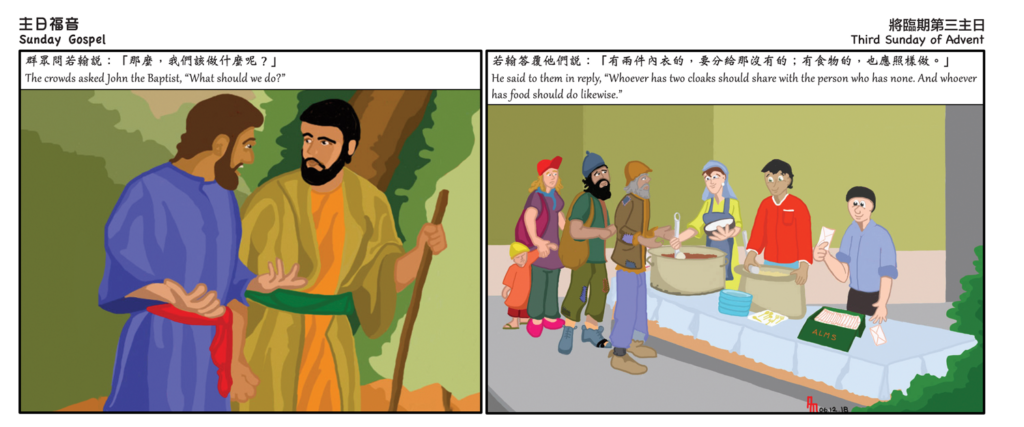Zephaniah 3:14-18a; Philippians 4:4-7; Luke 3:10-18
Shiu Lan
www.FLL.cc
In this third Sunday of Advent as we anticipate and prepare ourselves to relive the spirit of that first Christmas more than two thousand years ago, the scripture readings remind us of the comings of Jesus Christ. The Gospel reading is about the first coming of Christ and the Second reading is about His second coming.
In the Gospel reading, we can see and feel the people’s passionate anticipation for the coming of the Messiah who according to prophecy, was to deliver them from their distress and predicament in this world. They asked John the Baptist, “What should we do?” (Luke 3:12) as they awaited the coming of the Messiah. The advice from John the Baptist was for them to share what they had with those who had not, to be satisfied with what was due to them, to not be greedy. This advice is timeless, we must do what is right and just to our neighbors, even more so in this day and age of terrorism and self-destruction.
As we anticipate the re-birth of Christ in us in a spiritual way, we are also awaiting His second coming. The people asked John the Baptist “What should we do?” We also want to ask, “What should we do to have peace within us in a world of fighting, retaliation and violence with no peace in sight?” The answer is in the words of St Paul in the Second reading: “Do not worry about anything, but in everything by prayer and supplication with thanksgiving, let your requests be made known to God.” (Philippians 4:6) In other words, we are encouraged to pray and ask for God’s grace. We must offer to God our fears, worries and our needs. If we do so, “the peace of God, which surpasses all understanding will guard your hearts and your minds in Christ Jesus.” (Philippians 4:7)
We celebrate the Christmas spirit of joy, love and peace with our family and friends, people who are dear to us. As we engage ourselves in the festive celebrations, I remember what a colleague of mine does during Advent every year. She is not Christian. But she picks a charity every year to make a donation before she does her Christmas shopping to make sure that this act of charity would not be overlooked as the preparation for Christmas becomes hectic. Personally I am very impressed. I think this is a fine example of sharing what we have with those who are less fortunate. Such generosity is of special significance during Christmas, the season of giving and sharing.
Joy, a gift to be received
– Fr Fernando Armellini SCJ
Claretian Publications Limited
In today’s Gospel there are three groups – the people, the tax collectors, the soldiers – who go to the Baptist to ask “What should we do?”
Let’s imagine that one of us, eager to prepare well for Christmas, asks this same question to those we consider “experts” in the field of religion (catechists, pastoral worker, the nun, the priest). What would they tell us?
Someone would suggest to help a brother who is in difficulty or to visit a sick person. Others: “Recite the rosary every day”; “Pray three Salve Regina before going to sleep”; “Go and confess” … But for John, there were no religious activities but something else to say. “If you have two coats, give one to the person who has none; and if you have food, do the same.” He focuses on the new relationship that must be established with the neighbour. Love, solidarity, sharing, removal of inequities and abuses of power are the key words of his speech.
The first group is of the tax collectors. They enriched themselves by extorting money from the weak and defenseless. The Baptist does not ask them to change profession, but not to take advantage of their trade to exploit the poor.
We may think of not having anything to do with this profession. Instead – let’s face it – we act as “tax collectors” when, for example, we reach a prestigious position, we demand a very high pay for our performance, perhaps citing as justification: “These are the set rates.”
The publican is the symbol of one who casually handles money. He is also one who, with clever scams, manages to fool the simple people, evades taxes, weaves fraud against the state, and exploits the poor’s ingenuity to enrich oneself. Whoever acts as a “publican” certainly cannot prepare for Christmas only with a few prayers.
The soldiers are the last to ask the Baptist for advice. We would expect that John would ask them to immediately throw their arms and refuse to fight. But he is “tolerant.” Jesus will be more radical and will prohibit any recourse to violence. He will say to the disciple: “Do not oppose evil with evil; if someone slaps you on the right cheek, you turn and offer the other” (Mt 5:39).
The soldiers are the symbol of those who may abuse their power. Whoever profits from his occupied position, the profession one exercises to dominate or overwhelm the weakest behaves like a bad soldier. He is invited to review his behavior if he wants to prepare for the coming of the Lord.


 Follow
Follow


